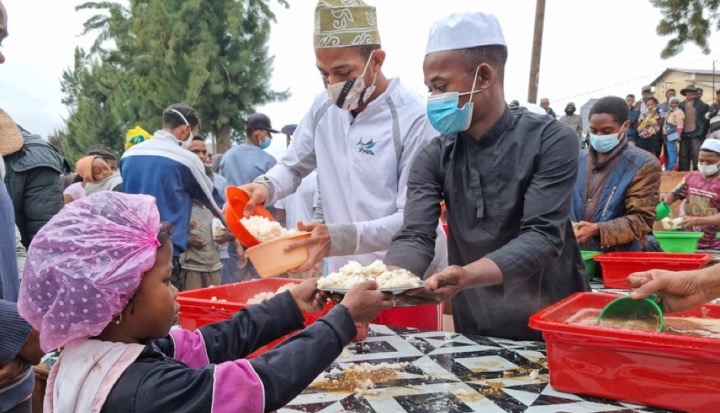As climate emergencies intensify, local networks of non-governmental organizations (NGOs) and businesses are emerging as key players in disaster risk management. By catalyzing early action and anticipatory action, these networks play an important and complementary role to governments in developing more resilient communities. Examples from El Salvador, Madagascar, Peru and the Philippines show that stronger partnerships between local networks and governments have the potential to transform disaster preparedness and response and enable greater integration into disaster management frameworks.
Local Networks: Drivers of Effective Humanitarian Action
In March 2023, Peru was hit by a cyclone that caused catastrophic floods and landslides for the first time in 40 years. More than half of the country has declared a state of emergency. Local networks quickly mobilized: the Startup Fund was released £300,000 for international NGOs and local partners Private sector networks such as Hombro a Hombro, providing life-saving humanitarian aid including cash transfers as well as food and hygiene kits provided storage space, conducted damage assessment and distributed essential items such as food and water. These local responses are just one example of how local leadership can make humanitarian aid more efficient, effective and equitable. communities affected by crises.
Local networks provide access to critical cultural insights and communities that allow for a more targeted and timely response. As PSHP Madagascar’s Tsiaroniaina Raberehareha notes, “The challenge lies in the clarity of decisions and managing the divergent interests of all actors,” but involving local businesses also supports the economic recovery of affected areas and increases long-term sustainability.
Shifting from reactive to anticipatory action
As climate change increases the frequency of extreme weather events such as floods, droughts and heat waves, we cannot wait for crises to occur. It is important to use tools such as early warning systems as well as mapping and pre-positioning resources. This proactive approach, sometimes adopted by local networks, but still far from the norm, also allows different partners to build relationships and align priorities before crises.
An example is the Startup Network project in El Salvador. Anticipating peak food insecurity in 2023, PRO-VIDA, a local NGO, raised the alarm through the Startup Fund, which resulted in £289,000 being distributed to vulnerable families. before the crisis fully unfolded.

The Role of Private Business in Anticipatory and Early Action
Private sector participation in disaster risk management has grown significantly in recent years and its importance public-private partnership in humanitarian action It was the focus of a United Nations Security Council debate in 2023. This goes beyond funding, businesses contribute valuable knowledge, skills and resources, including logistical support, technical expertise and innovative solutions.
The Philippine Disaster Resilience Fund (PDRF) launched a Business-led Emergency Operations Center (BEOC) in 2018. This center enables the PDRF to track, monitor and respond to disasters in real-time. By linking private sector resources with Government and humanitarian efforts, BEOC enables a faster, more organized response to crises and helps anticipate needs, facilitate communication between sectors and ensure that aid is delivered to where it is needed most.
PDRF is developing contracts with the private sector, such as logistics providers such as UPS and accommodation platforms such as AirBnB, to ensure resources are available as soon as a crisis is on the horizon. They are part of it Humanitarian Country Team. As Rene Meily explains, “In an emergency, it’s too late to change business cards. By planning ahead, PDRF ensures speedy delivery of aid, avoiding unnecessary delays.”
Similarly, in Madagascar, OCHA/UNDP’s Coordinating Business initiative (CBi) is working with PSHP to begin mapping and prepositioning goods for rapid deployment during crises.
Overcoming Challenges to Collaboration
Despite the clear benefits of public-private partnerships, challenges remain. As Meily points out, “Many companies prefer to help in times of trouble, but overcoming mistrust between the public and private sectors takes time and effort.” In addition, differences in operational processes, procurement methods, and communication can slow down collaborative efforts.
PRO-VIDA’s Eduardo González emphasizes that “decision-making processes can be slow and consensus can be difficult to achieve when trying to mobilize resources – but solving these problems in peacetime is essential to ensure that local networks can function effectively and efficiently during emergencies . .”
It is also important to consider how these local actors can be informally and formally integrated into trust-based disaster management processes and systems.
Next Steps: Strengthening Local Area Networks for Expected Performance
Looking ahead, the challenge for the humanitarian sector is to further leverage the potential of local networks by strengthening partnerships and continuing capacity-building efforts, and to use pre-arrangements for more effective activation in the event of a crisis.
“We need to better understand how NGOs and small businesses can work together to make sustainability a priority,” emphasizes Miami Rabarintsoa of PSHP Madagascar. What we need is a ‘whole of society’ approach where all actors work together to build stronger, more resilient communities.”
Conclusion: A Challenge to Proactive Leadership
The power of collaboration between private sector networks, NGOs and governments should not be underestimated. Local networks can act early, reduce the effects of disasters and strengthen long-term resilience. Working with and integrating existing disaster management frameworks can lead to more resilient, prepared communities. Anticipatory and early action will not only save lives, but also build a more sustainable future.
We would like to thank Disaster Risk Management Specialist Miami Rabarintsoa and PSHP Monitoring and Evaluation Officer Tsiaroniaina Raberehareh from the organization. Madagascar Private Sector Humanitarian PlatformRené Meily, President Philippine Disaster Resilience Fundand Eduardo González, Manager of Integrated Risk Management and Climate Change Resilience PRO-LIFE for their time and expertise providing critical insights for this article. Start networking and OCHA/UNDP Connecting Business initiative continue to engage and explore the potential for improved locally managed networks that act early and act with anticipation to protect lives before crises.

